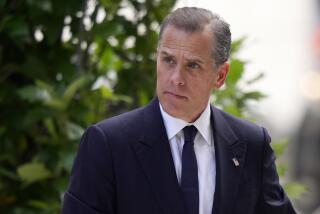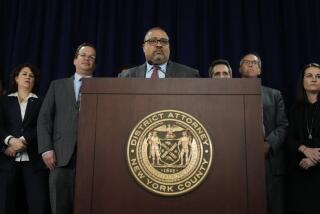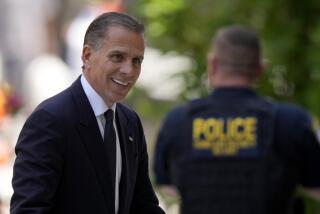Vernon Jordan Will Face Grand Jury Today
- Share via
WASHINGTON — Bill Clinton is a man with many friends, but the Washingtonian who stands out from all others who wear the FOB label will go before a federal grand jury this morning. Potentially that could pose problems for the president.
Vernon E. Jordan Jr., a confidant and frequent Clinton golfing partner, will be asked by independent counsel Kenneth W. Starr’s prosecutors about his efforts to line up employment for former White House intern Monica S. Lewinsky.
Knowledgeable sources say that Jordan is expected to tell grand jurors what he already has said publicly: that Lewinsky assured him she did not have a sexual relationship with Clinton. A source close to Jordan said the president told him the same thing.
But Jordan’s efforts to secure a private-sector job for the young woman and the fact that he apprised the president of his efforts have raised some doubts about his motivation.
Was Jordan, or the president, hoping to keep a grateful Lewinsky silent about an improper relationship with Clinton? Does Jordan have additional information harmful to Clinton’s interests that prosecutors could extract from him?
Although a lawyer by profession, Jordan does not enjoy an attorney-client relationship with the president--or Lewinsky--that would afford him the legal privilege of refusing to divulge what he knows.
In his only public statement, Jordan on Jan. 22 detailed his efforts to help Lewinsky:
“I assisted her in trying to find employment in the private sector in New York City. I referred her for interviews at American Express and at Revlon, where I am privileged to serve as a director. I also referred her to Young & Rubicam, a New York advertising agency.”
He said Betty Currie, the president’s secretary, had sent Lewinsky to him.
Jordan, 62, added that, when the former intern was subpoenaed by lawyers for Paula Corbin Jones, who is suing the president for sexual harassment, “I recommended a very competent Washington lawyer and I actually took her” to meet the attorney, Francis Carter. Jordan said he helped Lewinsky because her “drive, ambition and personality were impressive.”
But some critics maintain that it strains credulity that a multimillionaire Washington insider would go to such great lengths to help a low-level White House aide who normally would have trouble even reaching such a figure as Jordan on the telephone.
According to a colleague, Jordan “believes he has done nothing wrong and is looking forward to testifying before the grand jury and getting this behind him.”
Having “gotten his story out” early in Starr’s investigation, Jordan has become “tired of people assuming he was trying to hide something,” said the colleague and friend.
The colleague insisted that there is no truth to rumors that Jordan has sought to distance himself from the president--reports fueled by Jordan’s recent absence from Washington social events, where he once was the center of attention. However, on the advice of their attorneys, Jordan and Clinton have not conferred since the Lewinsky case surfaced, this source said.
The grand jury’s subpoenaing of Jordan raises questions about whether Starr considers him a “target”--one whom the prosecutor would want to indict for alleged obstruction of justice.
Because forcing a target to testify carries with it an aura of unfairness, it is unusual, but not unprecedented, for someone who is subpoenaed to be indicted.
Justice Department rules list three factors that prosecutors should consider before subpoenaing a potential target: how important that person’s testimony would be to the investigation, whether the same information could be provided by other witnesses and whether the information sought would be protected by a valid claim of privilege, such as the 5th Amendment protection against self-incrimination.
As a measure of Jordan’s political clout in Washington, normally outspoken lawyers on both sides of the issue would speak only on the condition of anonymity.
A Republican lawyer not connected with the investigation acknowledged that Jordan could give grand jurors an account that “seems potentially consistent” with Clinton’s denial of an affair and with statements by William H. Ginsburg, Lewinsky’s attorney, that there was no sexual relationship. If he sought to help Lewinsky only on the assurance that she had no illicit relationship with Clinton, Jordan would be protected from an obstruction-of-justice charge, this reasoning goes.
But Jordan “is facing a dilemma,” the lawyer said. “If he is notified that he is the target or a subject of the investigation, it would be prudent for him to take the 5th Amendment. Politically, however, I don’t think he could do that.”
A Democratic lawyer and former prosecutor commented that, “if there is no evidence of an improper Lewinsky-Clinton relationship, there’s no way to make a case against Jordan. There would be no quid pro quo.”
Times Chief Washington Correspondent Jack Nelson and staff writer David Willman contributed to this story.
More to Read
Sign up for Essential California
The most important California stories and recommendations in your inbox every morning.
You may occasionally receive promotional content from the Los Angeles Times.













